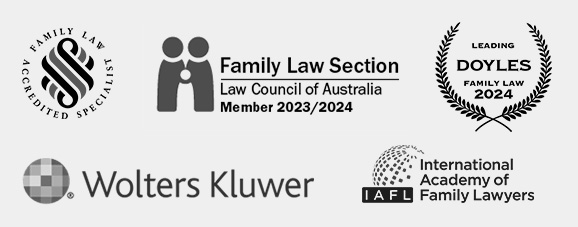Child Support & Spousal Maintenance
Child Support Lawyers Melbourne
Child support and spousal maintenance can be important aspects of a financial settlement. We give advice and options as to the best approach and outcome, including drafting and advising on child support agreements.

Our Expertise & Approach
Child support is usually resolved outside the court system. We will discuss child support with you to ensure that the correct amount is being paid, given your overall circumstances. We can assist clients to prepare for applications that will be decided upon by the Department of Human Services – Child Support.
We also advise clients about whether they can make a successful claim for spousal maintenance, or how to defend a claim made against them. We regularly draft Financial Agreements in relation to protection from future spousal maintenance claims.
What is spousal maintenance?
Spousal maintenance is financial support payable by a husband or wife to the other to pay spousal maintenance if they are unable to support themselves adequately. Once established, the liability may continue after divorce.
Spousal maintenance can be applied for at any time before a divorce becomes final. However, once a divorce becomes final, there is a 12 month time limit for bringing an application for spousal maintenance. It is more difficult to apply for spousal maintenance after this 12 month limit.
Hidden First Field
What the court considers
There is no automatic right to spousal maintenance. The applicant must show their need for maintenance and the other party’s capacity to pay. A spouse could show a need for spousal maintenance if they are unable to support themselves adequately:
- by reason of having the care and control of a child or children of the marriage who are under 18 years of age
- by reason of age or physical or mental incapacity for appropriate gainful employment
- for any other reason.
The applicant is entitled to a standard of living which is reasonable in all the circumstances. In determining whether an order for spousal maintenance should be made, the Court will disregard any entitlement of the spouse seeking maintenance to any income tested pension, allowance or benefit.
Once a need for spousal maintenance has been established, the capacity of the other party to pay is considered. There are a number of factors that the court considers when calculating spousal maintenance, including:
- the age and health of both parties
- the capacity of each party for gainful employment
- the income and financial resources of each party
- whether either party has control and care of a child under 18 years of age
- what is a reasonable standard of living in all of the circumstances
Spousal maintenance can take several forms. The Court may order spousal maintenance as:
- periodic payments
- a lump sum payment – whether in one amount or by instalments
- a transfer of property
Spousal maintenance can continue indefinitely or be for a specific period of time. Spousal maintenance may be payable until the finalisation of the parties’ property settlement. Receipt of lump sum or periodic spousal maintenance has no effect on pension entitlements. However, receipt of lump sum or periodic maintenance can affect entitlement to family payment.
Spousal maintenance can be varied with a change of financial circumstances of either party or a change in the cost of living. Spousal maintenance ceases when the party receiving the maintenance remarries or dies. Maintenance payments will automatically cease upon death of the payer or a date on which the order states it will end.
Child Support FAQs
Hidden First Field
What is child support?
Child support is financial support paid by parents towards the day-to-day expenses of a child. It is calculated on a formula by Child Support Services Australia – Child Support.
When does child support stop?
Child support is payable for children who are either under 18 or if turning 18 in a year in which the child is in full-time secondary education, until the last day of that secondary school year. The last day of secondary education is the later of the following:
- if the child is not required to sit an examination, the last day of classes for the school year (as determined by the school); or
- if the child is required to sit an examination, the later of the last day of the period of examination for the child’s year level and the last day of classes for the school year (as determined by the school).
What happens when a child turns 18?
Child support is payable for children who are either under 18 or if turning 18 in a year in which the child is in full-time secondary education, until the last day of that secondary school year. After child support stops a court order for child maintenance can be made which takes into account the proper needs of the child and the ability of each party and the child to contribute to those needs. Child maintenance may be sought by or for children who are:
- over 18 who are still studying;
- over 18 who have a disability or medical condition which restricts them from becoming fully independent.
What income is used to calculate child support?
Child support income is the total of taxable income and supplementary income for the year of the last lodged tax return less the deductions for self-support, any relevant dependent child amount and/or a multi-case allowance amount. Taxable income is income before payment of tax and the Medicare levy.
The definition of “income” includes salary-sacrificed superannuation contributions and net losses from financial investments.
Supplementary income is the total of any exempt foreign income, net rental property losses and reportable fringe benefits. Some tax-free pensions or benefits are included such as disability support pensions, wife pensions, carer payments, invalidity service pensions, partner service pensions, income support supplements and Defence Force Income support allowance.
Some of each parent’s income is excluded from the calculation and set aside as an allowance for basic living expenses. This is called the self-support amount. For child support periods starting on or after 1 January 2021, the self-support amount is: $26,319. This figure is increased for relevant dependent children.
If Child Support cannot easily discover a parent’s current taxable income, it can nominate a “default income”. For periods commencing on or after 1 January 2021, it is the greater of:
- taxable income for an earlier year adjusted by an indexing factor; and
- $52,638 which is 2/3 of annualised male total average weekly earnings.
An assessment based on default income can be amended later if Child Support receives better information.
The child support cost percentage depends on the amount of care undertaken by the payer for whom child support is paid.
How Do I make my child support agreement binding?
An agreement about child support is usually set out in a child support agreement. Making court orders by consent about child support is legally complicated. It is usually easier to enter into a binding or limited child support agreement.
Binding child support agreements must meet similar requirements to financial agreements, although the legal advice requirements are slightly different. Limited child support agreements are simpler than binding child support agreements to make, easier to set aside and can only last for a maximum of 3 years.
The main requirements for a limited child support agreement are:
- the child is eligible for a child support assessment;
- there is a child support assessment;
- it does not provide for the discharge of arrears; and
- it is in writing and signed by both parents.
Binding child support agreements are more formal and “final” than limited child support agreements. The requirements are the same as for financial agreements. The grounds for setting aside are similar as for financial agreements.
The main difference is that any changes that have arisen since the child support agreement was made must be “exceptional” which is a much higher test than for financial agreements (which require a “material” change in circumstances) or limited child support agreements (which require a “significant” change in circumstances).
Binding Child Support Agreements can be administratively terminated if there has been a sufficient change in the care arrangements of the children.
How does child support work if one parent lives overseas?
The enforcement of child maintenance and child support when a child lives in one country and the payer of child support lives in another country is becoming easier. Australia has arrangements with many countries to simplify the assessment and collection of child support and child maintenance.
International treaties and other arrangements aim to ensure that liabilities to pay child support are issued and administered by the country in which the carer resides. They are enforced by the country in which the payer resides. It is more difficult for parties to “forum shop” seeking that child support be assessed in the country which gives the best outcome. It is also less likely that a carer will have to travel overseas to defend a payer’s application to reduce child support.
A carer who lives in Australia can apply for a child support assessment if the payer is a resident of Australia or a reciprocating jurisdiction when the application is made. A carer who lives in a reciprocating jurisdiction can apply for a child support assessment in Australia even if the child is not resident in Australia. The payer must be a resident of Australia.
There are over 80 reciprocating jurisdictions, including Italy, the United Kingdom, Malaysia, South Africa and Hong Kong.
However, if the payer is living in Israel, Papua New Guinea and the Yukon Territory of Canada the carer must obtain a court order for child maintenance in Australia.
Child Support can register certain overseas child maintenance liabilities and spousal maintenance liabilities for collection in Australia. Child Support collects amounts payable under the liability and the overseas authority administers the assessment.
A carer can apply to Child Support to register overseas maintenance liabilities that are not for periodic amounts, eg lump sum spousal maintenance or medical expenses. Non-periodic liabilities remain a debt due to the carer, not the Commonwealth.
A parent who is eligible to apply for a child support assessment in Australia or a maintenance assessment in a reciprocating jurisdiction can effectively vary an overseas court-ordered maintenance liability by applying for an assessment. The overseas court order ceases to have effect in Australia if Child Support registers a child support assessment or an overseas maintenance assessment. The overseas court order is no longer enforceable in Australia, except for any arrears. The order remains enforceable in the original jurisdiction. The payer can apply to that court to have the original order discharged.
Australia and New Zealand have a special agreement which allows the New Zealand Inland Revenue Child Support and Child Support in Australia to collect child support liabilities assessed by each other.
The United States of America and Australia have an agreement that the liability is assessed in the country in which the carer lives. Each country must help the other by locating payers, serving notices and providing advice and sharing information.
Customer Reviews
Contact Forte Family Lawyers
CONTACT
Our professional Family Lawyers in Melbourne are ready to listen.
Level 2
535 Bourke Street
Melbourne 3000 Victoria Australia
PO Box 13172
Law Courts
8010 Victoria Australia
DX 364 Melbourne
Telephone
61 3 9248 5800
Email
enquiries@fortefamilylawyers.com.au

"*" indicates required fields



